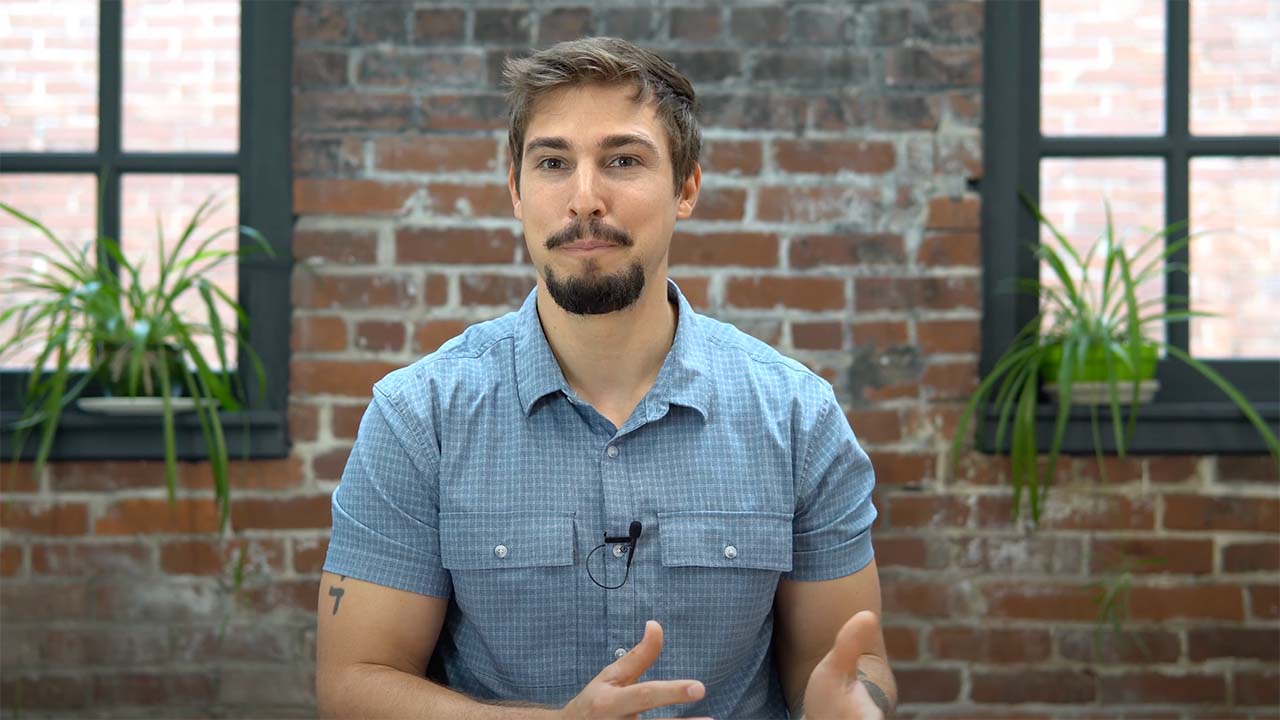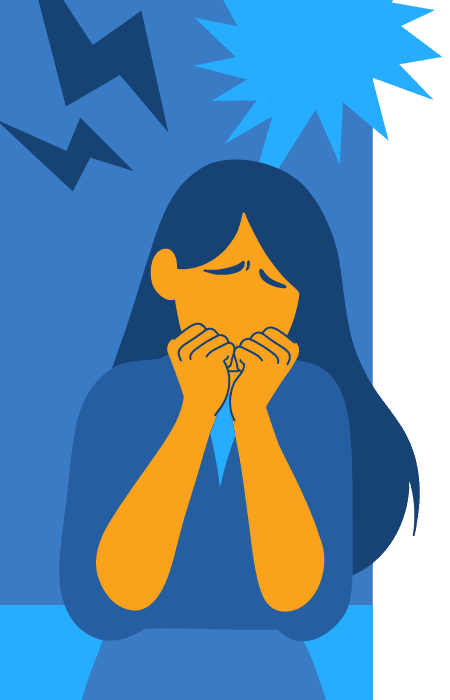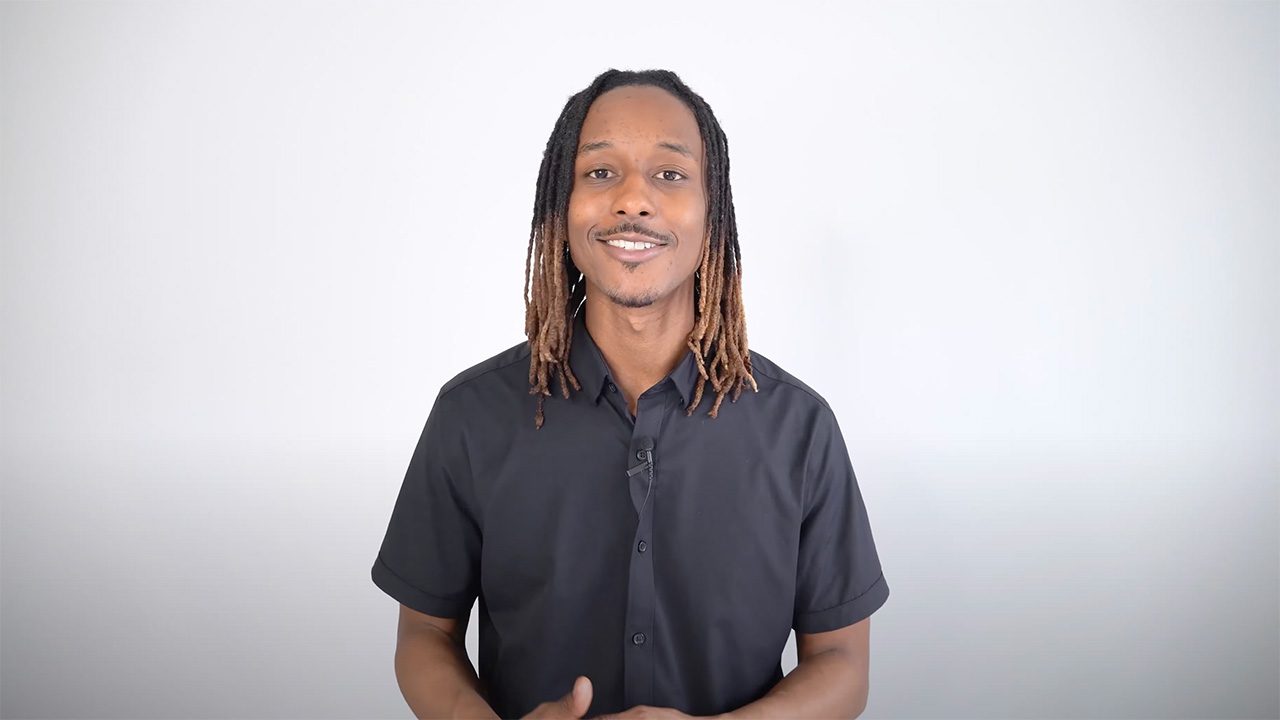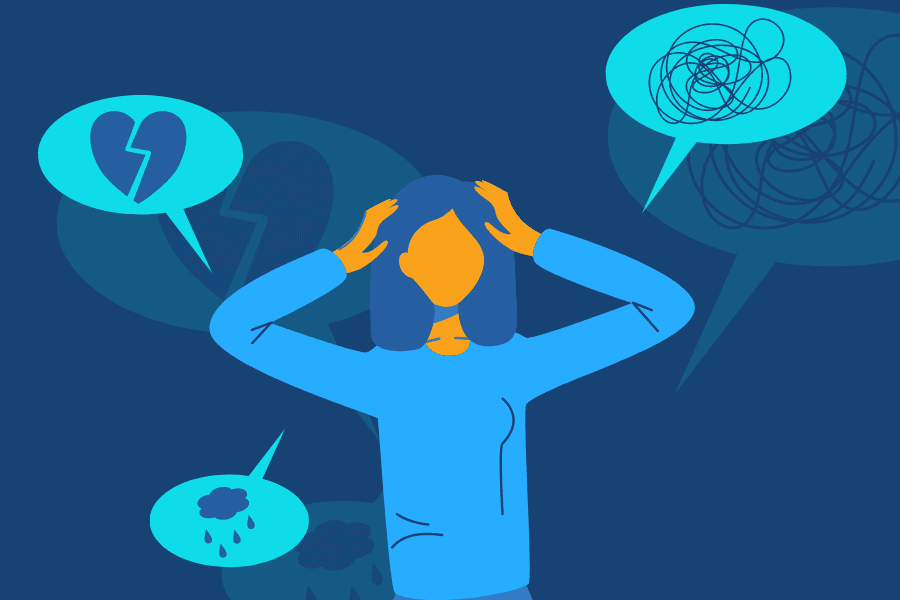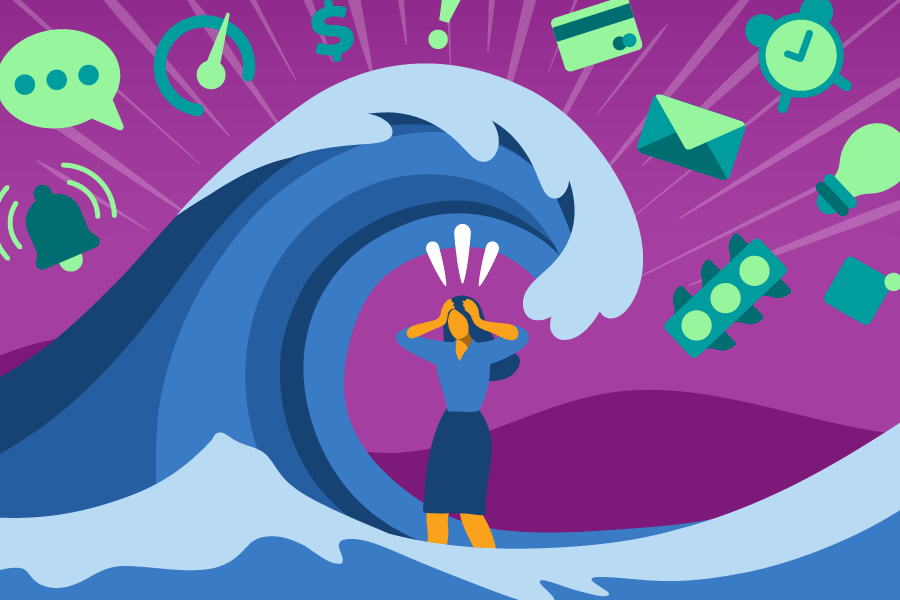Anxiety & What it Feels Like
What is Anxiety Disorder?
Many people experience anxiety from time to time.
When faced with high amounts of stress, uncomfortable situations, or new life changes, it is expected that a person will become nervous, tense, or anxious.
However, anxiety disorders span much further than these occasional worries.
With anxiety disorders, a person has worries, fears, and dread that interfere with their daily life.
According to the National Institute of Mental Health, when an individual has an anxiety disorder, their anxiety doesn’t go away, and it can get worse over time. Anxiety is considered a mental illness and can be treated as a medical condition.
There are different kinds of anxiety disorders, each with different symptoms.
What are the Types of Anxiety Disorders?
The types of anxiety disorders include:
- Generalized anxiety disorder
With generalized anxiety disorder (GAD), a person has persistent feelings of anxiety that interfere with everyday life.Typically, individuals with GAD experience frequent anxiety for months and even years. They may also experience anxiety attacks, which can include heart palpitations, shortness of breath, and feelings of fear.
- Panic disorder
Individuals with panic disorder experience frequent and unexpected panic attacks.Panic attacks involve sudden feelings of intense fear, discomfort, or a sense of losing control, even in unthreatening circumstances. There are also physical symptoms of panic attacks. These episodes are sometimes confused with heart attacks since they are accompanied by a pounding heart and trouble breathing.
- Social anxiety disorder
With a social anxiety disorder, a person has such an intense fear of being judged by others that they fear social situations.When a person has social anxiety, it can get in the way of everyday responsibilities, like going to school, going to work, or interacting with other people.
- Phobia-related disorder
A phobia refers to an intense fear of specific objects or situations.When a person has a phobia-related disorder, they have an excessive or sometimes irrational fear or worry about facing the feared object or situation.
Some types of phobia-related disorders can include social anxiety disorder (or social phobia), agoraphobia, separation anxiety disorder, or specific phobias, like a fear of heights or blood.
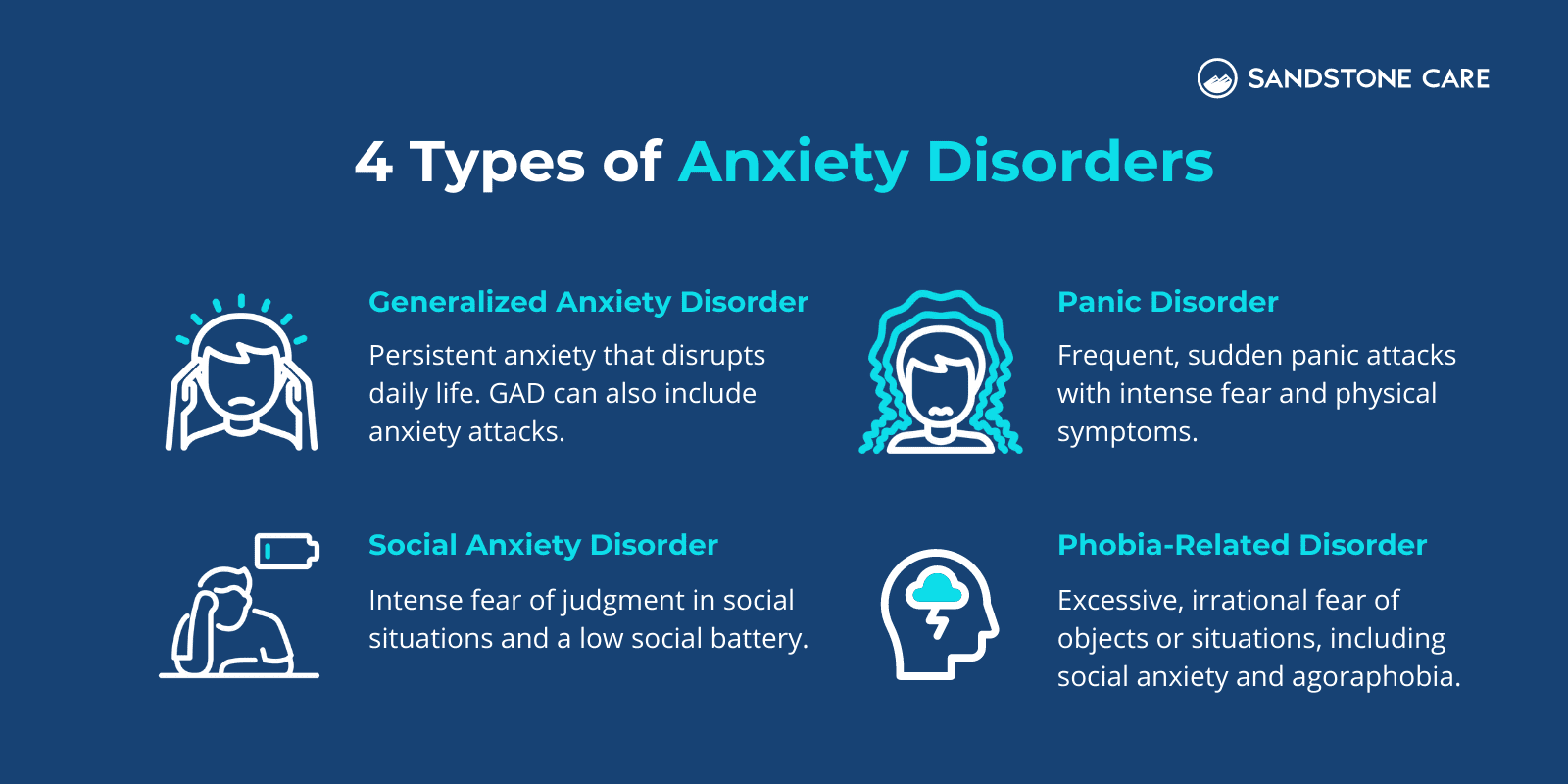
Are Stress And Anxiety The Same Thing?
Stress and anxiety are not the same things; however, they often relate to each other.
When a person experiences stress, they may feel frustration, irritability, tension, fatigue, and other physical and mental symptoms.
Anxiety is characterized by fears and worries that don’t go away.
Stress is one of the most common triggers for anxiety. When a person is under a lot of stress or is faced with a stressful situation, it can become overwhelming. When there is a particularly stressful situation, a person with anxiety can become even more worried or tense than they were before.
Stress and anxiety can cause many common feelings and emotions. Although they are not the same, they can interact in ways that worsen symptoms.
When a person is stressed, it does not necessarily mean they have anxiety. However, if they are unable to cope with their stress, and find that it is causing them to feel so worried that they cannot function in their day-to-day responsibilities, they may have an anxiety disorder.
What Triggers Anxiety?
Everyone can have different anxiety triggers; however, some of the most common can include:
- Stress
- Trauma or traumatic events
- Substance use (including caffeine consumption)
- Lack of sleep
- Messy or unhealthy environment
- Social situations
- Physical health conditions (such as thyroid problems or heart arrhythmia)
- Medications
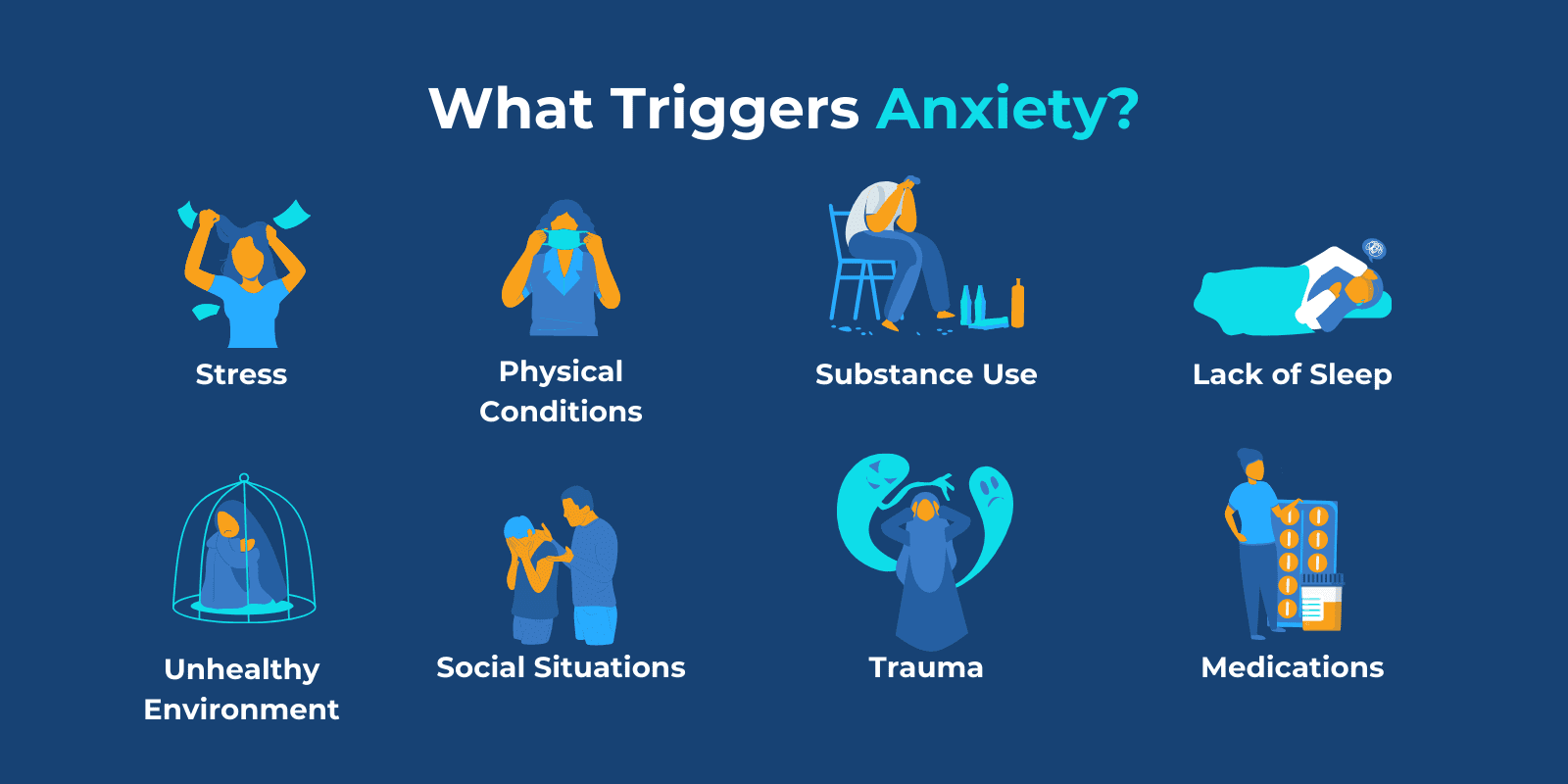
Can Anxiety Cause Strange Symptoms?
Some people with anxiety may experience what feels like unusual symptoms.
For example, some people may experience gastrointestinal issues when their anxiety is triggered, or develop rashes or hives on their skin from anxiety and stress. Some people experience high blood pressure from their anxiety attacks.
Everyone has different symptoms and different experiences. Unusual symptoms can make it hard for a person to realize that what they are experiencing may be related to anxiety, making it harder to know when and how to ask for help.
Additionally, anxiety presents itself in different ways across every individual. Just because a person seems completely fine or doesn’t seem that they are worried or nervous on the outside, doesn’t mean that they aren’t facing symptoms of anxiety on the inside.
How Does Anxiety Affect The Body?
Anxiety can cause stress on the body and impact numerous systems, including the nervous, immune, cardiovascular, respiratory, and digestive systems.
The effects of anxiety on the body can be related to excessive levels of stress hormones such as cortisol, adrenaline, and noradrenaline, which activate the body’s fight or flight response.
The fight or flight response activates when a person is faced with a situation or event that is perceived as dangerous, stressful, or frightening.
This response can cause the body to respond with sudden symptoms such as rapid breathing, increased heart rate, or increased body temperature.
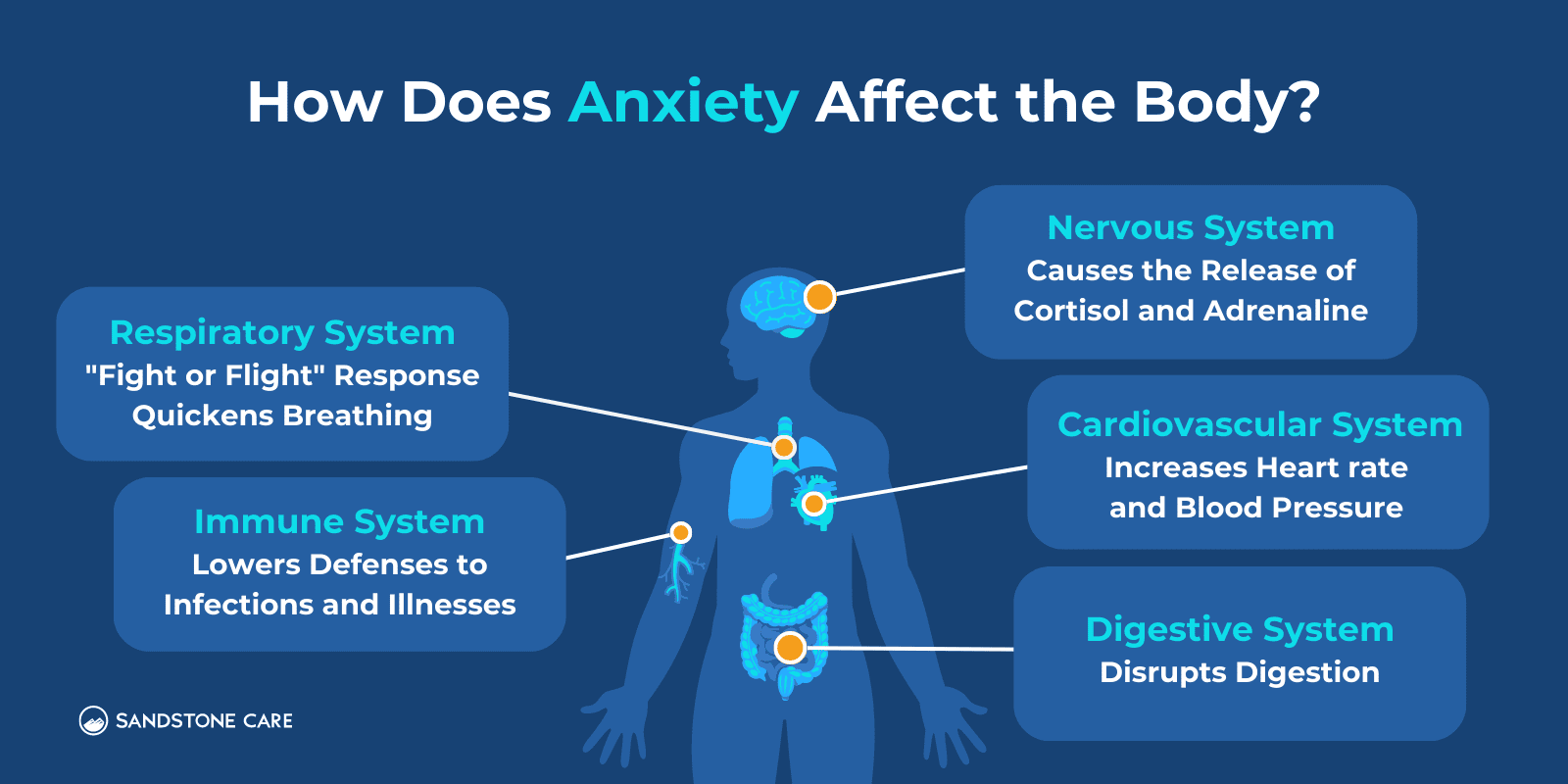
Physical Symptoms of Anxiety
Anxiety causes not only mental symptoms but physical ones as well.
Common physical symptoms of anxiety can include:
- Shortness of breath
- Increased heart rate
- Dizziness
- Abdominal, head, or chest pain
- Fatigue
- Trouble sleeping
The symptoms of anxiety can manifest differently in each person. Some may have mild or moderate symptoms, and others may have more severe symptoms.
Anxiety doesn’t look the same in everyone. Some people display more physical symptoms like those above, while others may experience more mental or emotional symptoms.
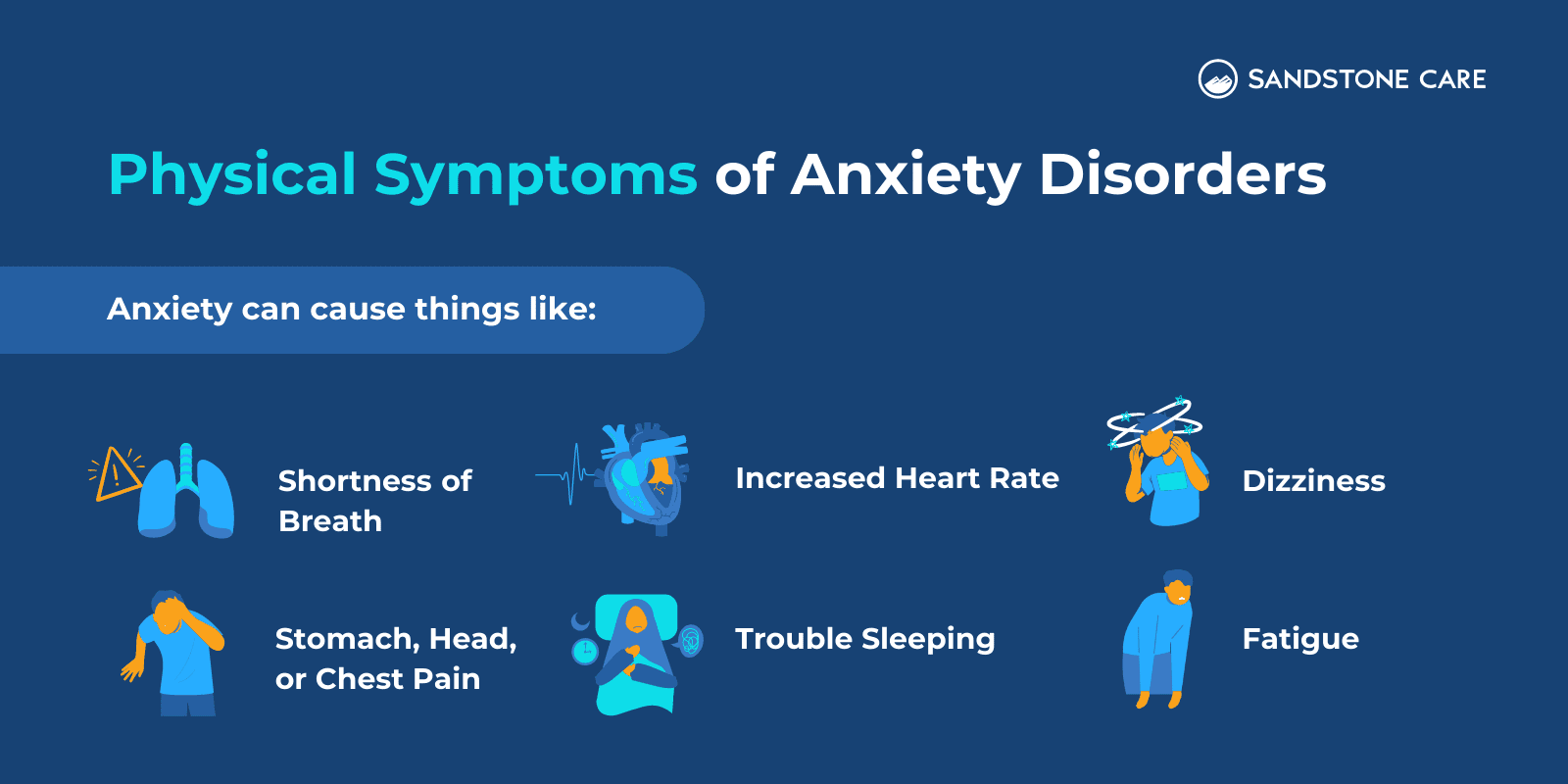
What Does Anxiety Feel Like Physically?
Different people with anxiety may give different explanations of what anxiety feels like for them, and each person’s experience is valid.
Anxiety can make it feel hard to catch your breath, you may feel hot as if you were standing directly under the sun, or you may feel that the world is spinning around you.
It can also make you feel physically ill in some cases, or lead to aches and pains that don’t seem to have an explanation.
A person may become so anxious that it feels that they are going to throw up or they become weak in the knees.
Anxiety can also make it hard to physically get up and carry through with everyday tasks. Sometimes, a person living with anxiety sleeps a lot. Other times, individuals with anxiety may have trouble sleeping every night and stay up until the early morning hours.
Can Extreme Anxiety Cause Physical Symptoms?
Extreme anxiety often comes with both physical and mental symptoms.
Especially when left untreated, extreme anxiety can cause physical health problems and affect a person’s overall well-being.
What Is The Most Common Physical Symptom Of Anxiety?
The physical symptoms most commonly associated with anxiety include headaches, shortness of breath, increased heart rate, and fatigue.
What Does Anxiety Back Pain Feel Like?
Anxiety back pain can involve muscle tension, stiffness, soreness, or even spasms in the back.
It can become very painful and make moving and getting around hard.
When a person is experiencing great amounts of stress or anxiety, that tension often gets built up in the upper and lower back.
What Does Shortness Of Breath From Anxiety Feel Like?
When shortness of breath comes from anxiety, it may feel like you cannot catch your breath, like you are suffocating, or that your chest is tight.
One way that sets shortness of breath from anxiety apart from shortness of breath from other health conditions is that it commonly occurs when a person is at rest and not overexerting themselves.
What Does Anxiety Stomach Pain Feel Like?
Stomach pain that is associated with anxiety can feel like cramps, tightness, knots, nausea, or “butterflies” in the stomach.
For example, if a person has a severe fear of heights and stands by the edge of a cliff, you can imagine how their stomach would feel. People with anxiety may have this feeling in their stomach when their symptoms are triggered or when they are faced with high stress. Some people may lose their appetite or even experience nausea or vomiting.
When someone has anxiety, something as simple as going to the grocery store can feel like standing at the edge of a cliff. Even if it may not seem stressful from an outside perspective, the physical effects of fear are very real.
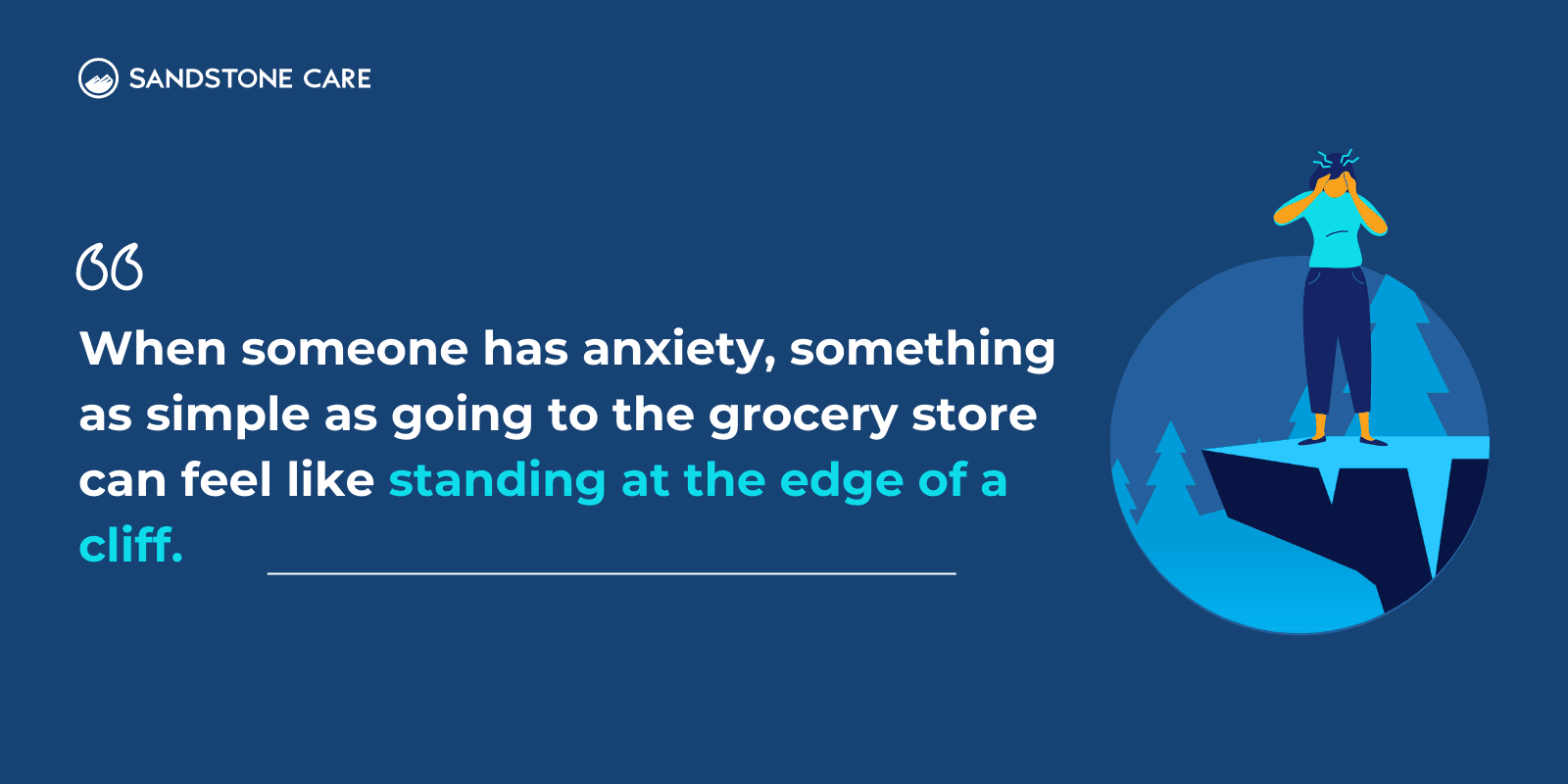
What Does Anxiety Chest Pain Feel Like?
A person with anxiety may experience chest pain that comes on suddenly but slowly improves.
Most people feel improvement within ten minutes.
But, anxiety chest pain can feel like pressure or tightness in the chest area. It can be a sharp and shooting pain, can be more of aching pain, or even feel like a burning sensation.
Emotional Symptoms of Anxiety
The most common emotional symptoms of anxiety involve dread, worry, and fear.
These feelings can cause a negative loop of thoughts and feelings, affecting many aspects of a person’s life.
What are the Five Emotional Signs of Anxiety?
5 emotional signs of anxiety can include:
- Nervousness and restlessness
- Helplessness
- Sense of dread or fear
- Being unable to relax
- Uncontrollable worries
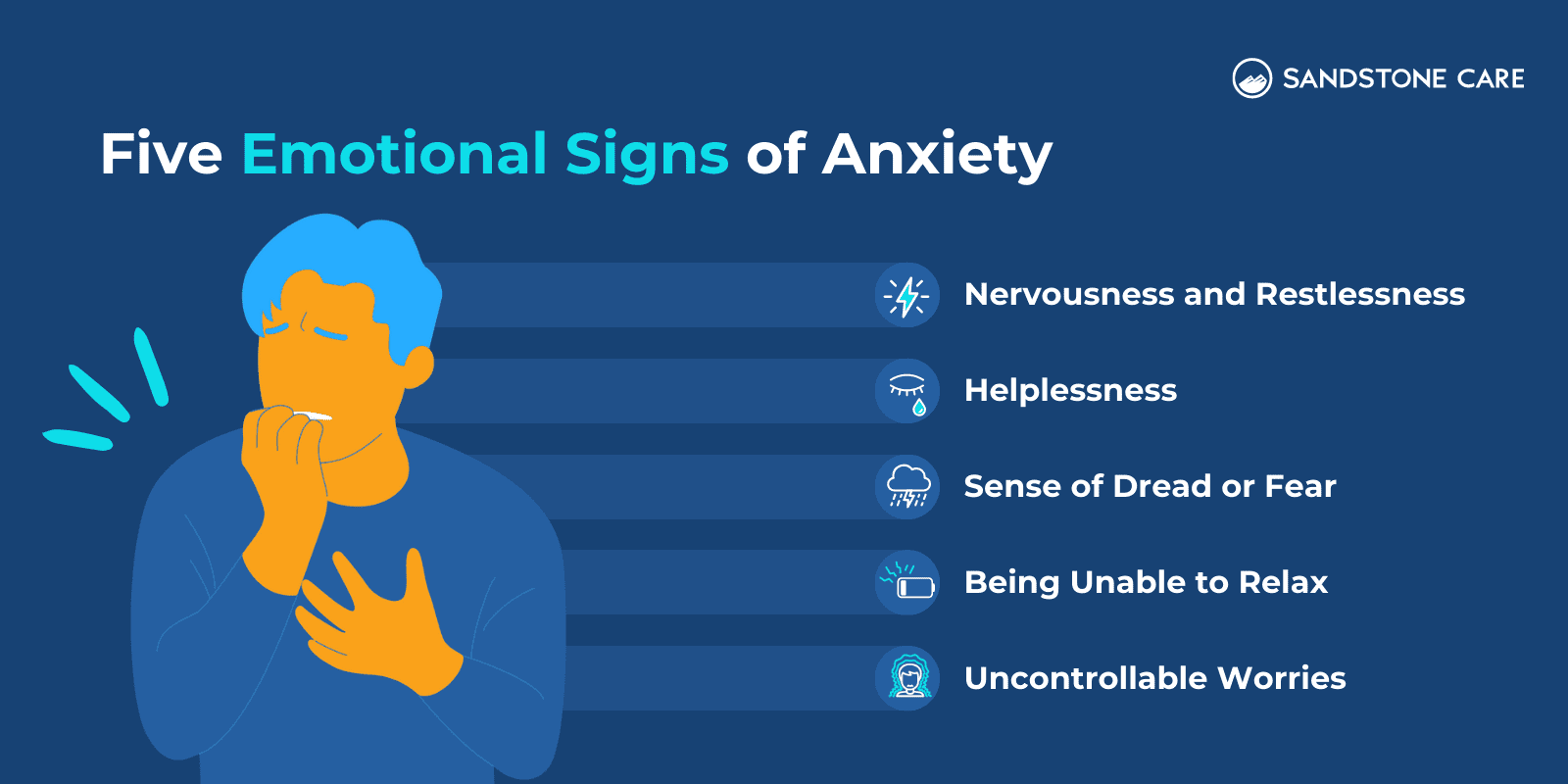
What are Intense Feelings of Anxiety?
Intense feelings of anxiety happen when a person has excessive worries that impact their daily life.
They often think of the worst, are constantly “on edge,” and may feel that they cannot control their feelings and behaviors.
What Does Anxiety Feel Like Mentally?
Anxiety is often mentally draining.
A person may feel at war with themselves and in a constant battle of trying to escape their negative thoughts but finding it challenging to do so. Anxiety often accompanies other mental health challenges such as obsessive-compulsive disorder, post-traumatic stress disorder, and depression.
What Does Separation Anxiety Feel Like?
Separation anxiety can make a person feel afraid and worried when they are away from the people they are close to.
They may think about all the bad things that could happen and even feel unwell when they are separated from their loved ones.
Behavioral Symptoms of Anxiety
Not only does anxiety affect a person’s mental health, but it also causes behavioral symptoms and can impact a person’s everyday life and relationships.
Common behavioral symptoms of anxiety involve avoidance or agoraphobia, compulsive behavior, and irritability. It can also cause isolation or social withdrawal. For some, symptoms are difficult to identify since they are hidden out of shame, such as in high-functioning anxiety.
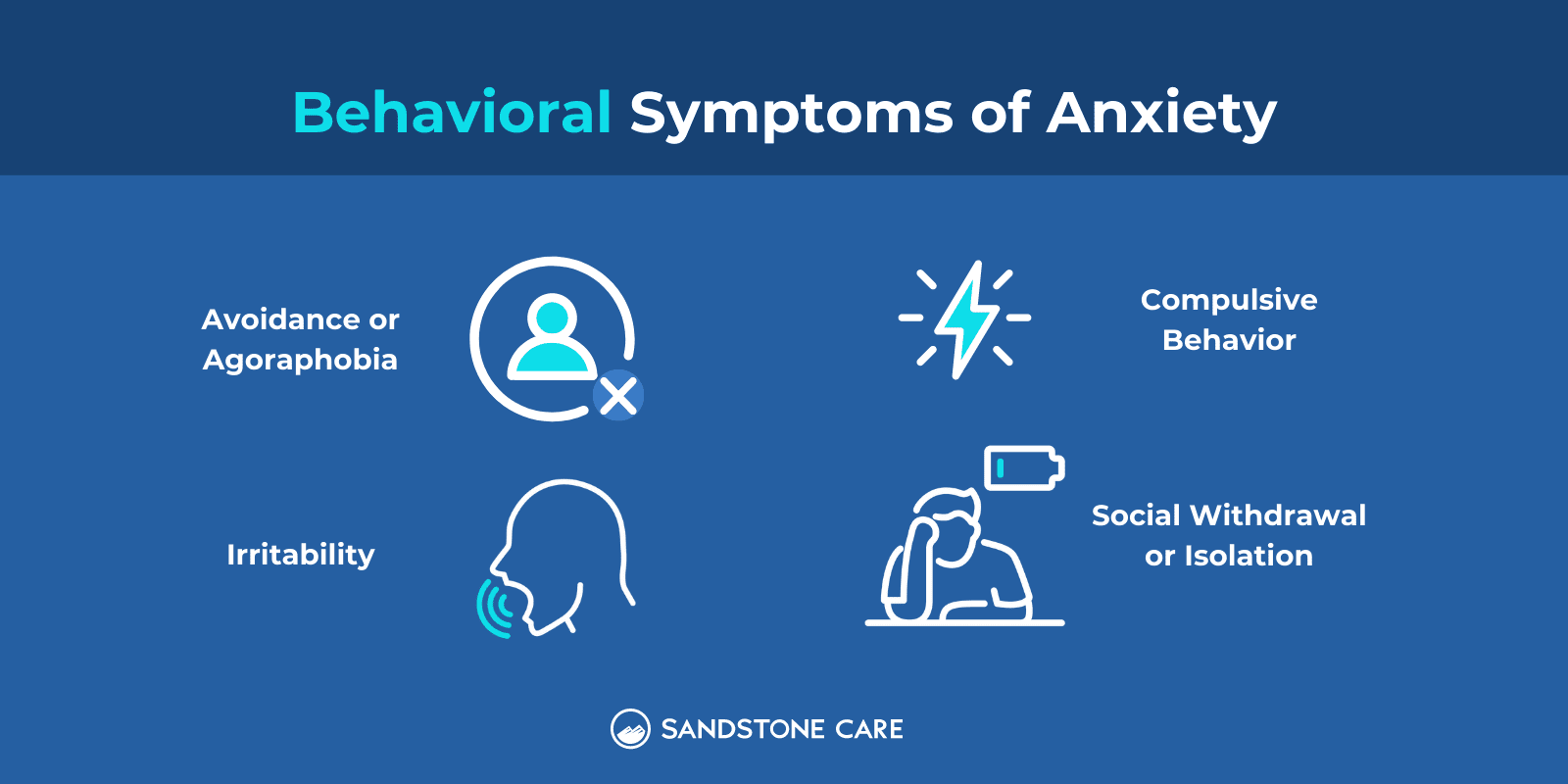
Can Anxiety Cause Behavior Problems?
Anxiety, especially when left undiagnosed and untreated, can lead to behavior problems due to pent-up emotions, frustration, and overwhelming feelings.
Specifically, with young people like children and teens, it can be hard to express these difficult feelings and experiences, which may end up presenting themselves with behavioral problems.
Some individuals with anxiety may show signs of irritability, may act compulsively, or may isolate themselves, even from people they love.
What Does Social Anxiety Feel Like?
Social anxiety can be different for each individual.
Some people may have an intense fear of talking to strangers, and it can make it hard to talk to someone taking their order at a restaurant or be in a situation where they know they have to interact with other people.
Others may have a fear that people will notice they’re anxious, and when they are in social settings, they might become hypervigilant and self-conscious.
Does Anxiety Cause Anger Outbursts?
Symptoms of anxiety can become very overwhelming, especially when a person is faced with high stress or triggering situations.
Irritability can be a common symptom of anxiety, which may lead to frustration and anger. Irritability can strain personal relationships, especially since it can be difficult to tell that it is linked to anxiety.
Some people tend to suppress their emotions, and when they bottle them up for long enough, it can result in an outburst of emotions.
Going to therapy and practicing healthy coping mechanisms can help manage and prevent anger outbursts.
Many people with anxiety are hesitant to reach out for support, but it is important to know that you are not alone and that talking to someone can help you feel better.
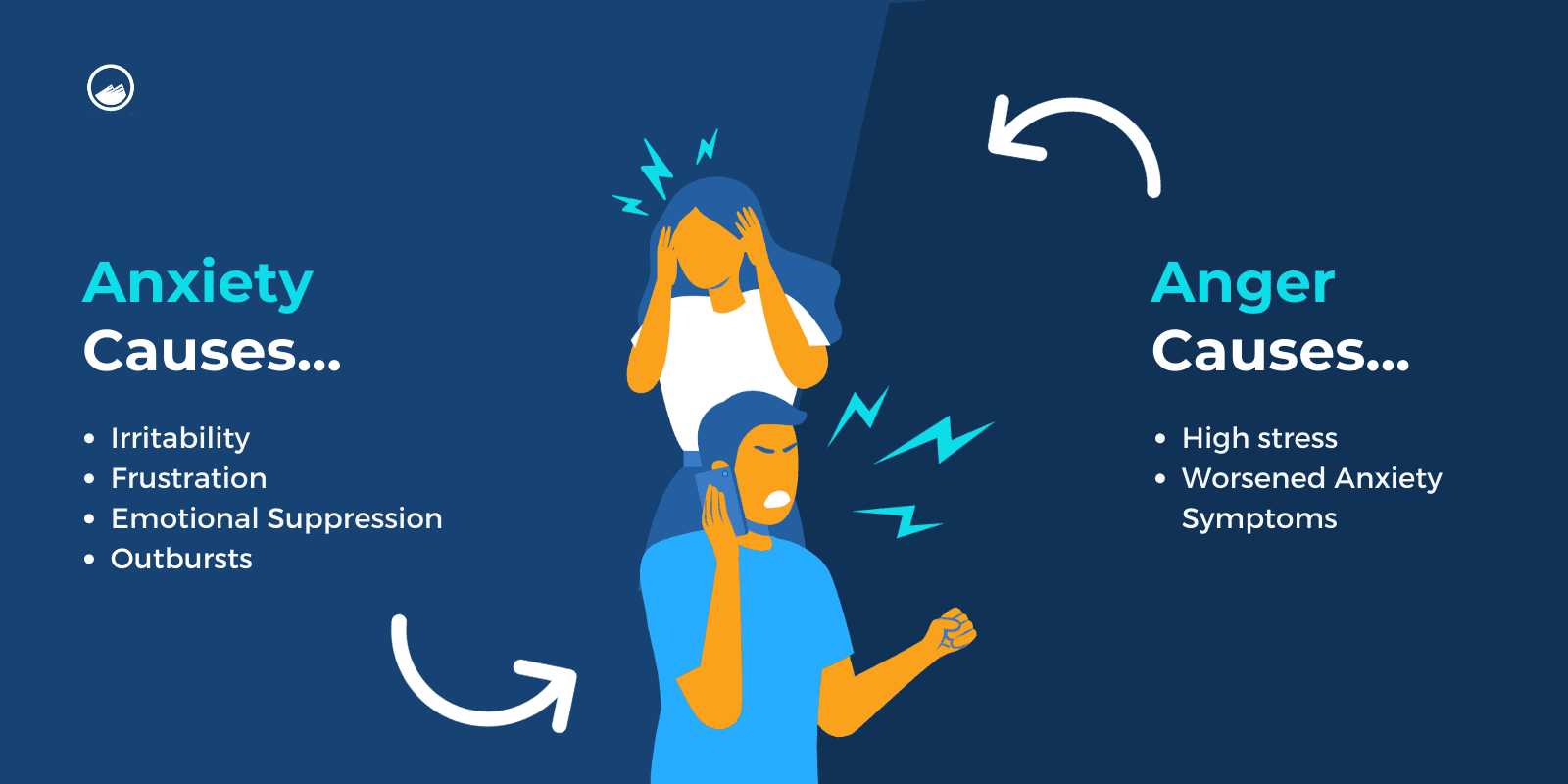
What Causes Meltdowns?
Emotional meltdowns happen when a person has reached a breaking point and becomes overwhelmed with emotions.
Meltdowns can look different from person to person. One person may cry uncontrollably, another person may lash out in anger, and others may run away from a situation altogether.
Anxiety is a common cause of meltdowns.
With anxiety, a person is faced with challenges that can be hard to cope with daily. When they are confronted with stress, big life transitions, or other triggers, it can feel almost impossible to manage.
Finding coping strategies that work for you can help prevent and/or manage meltdowns, such as:
- Practicing deep breathing exercises
- Going outside
- Doing physical exercise
- Practicing mindfulness and meditation
Can Anxiety Make You Defensive?
Sometimes, anxiety can make a person defensive.
This may be because they feel threatened, even if they are not in a threatening situation, or it may also be because they are not sure how to communicate what they are feeling, so they come off as defensive.
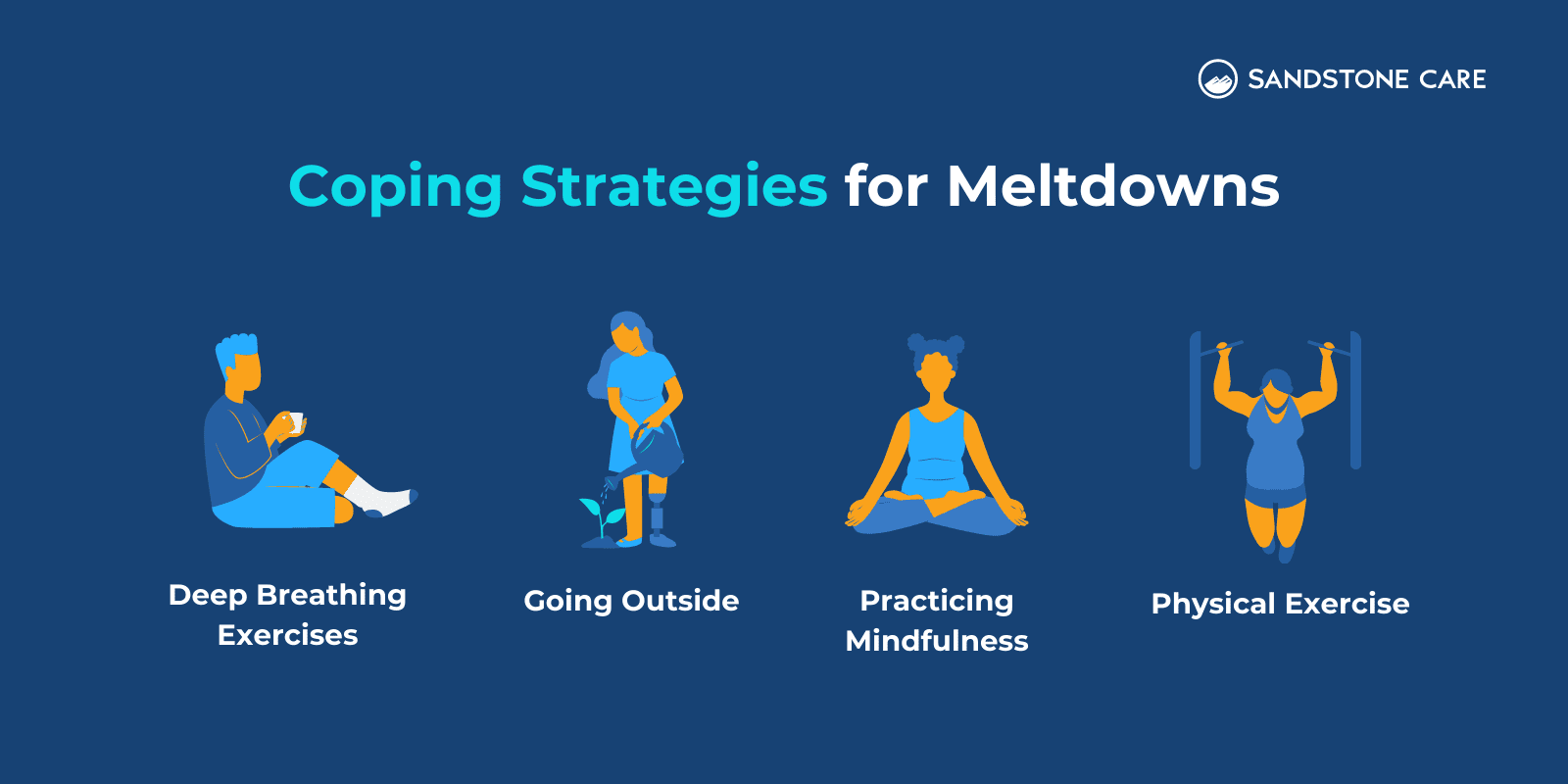
Anxiety Diagnosis
How is Anxiety Diagnosed?
To diagnose anxiety disorders, a doctor often goes over a physical exam, your history, symptoms, and orders blood tests to rule out any other conditions, such as hypothyroidism.
A psychologist or other mental health professionals may diagnose anxiety and can help you figure out different treatment options.
How Can I Know If I Have Anxiety?
If you think you may have anxiety, it is best to reach out for support and seek help from a professional to get a proper diagnosis.
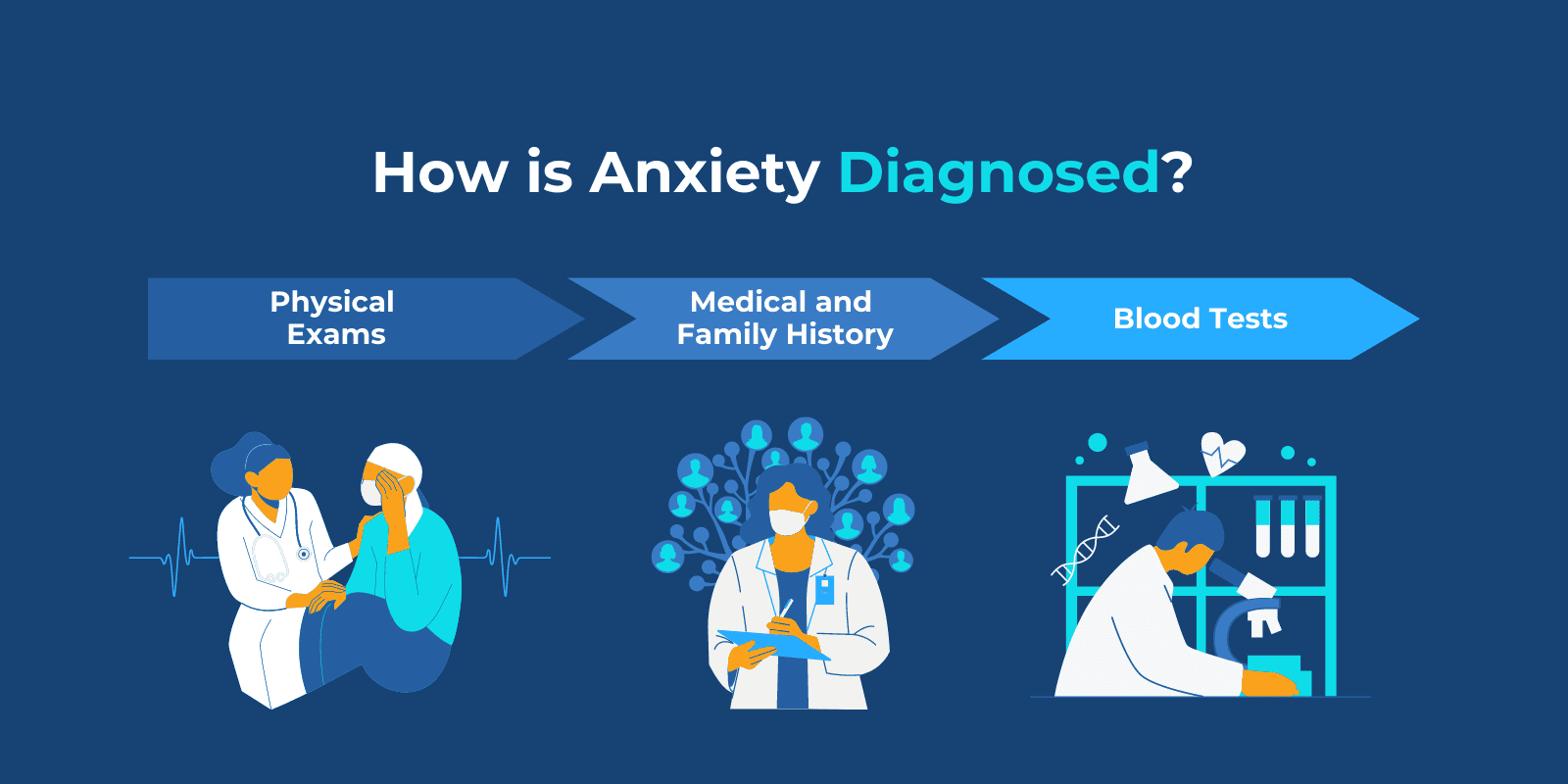
Can You Self-Diagnose?
Anxiety cannot and should not be self-diagnosed.
It is best to talk to a professional and get a proper diagnosis to ensure that your symptoms are from anxiety or another health condition so that you can receive appropriate help and treatment.
What is Anxiety Mistaken For?
Anxiety may be mistaken for other conditions like cardiac issues, gastrointestinal conditions, or other mental health conditions.
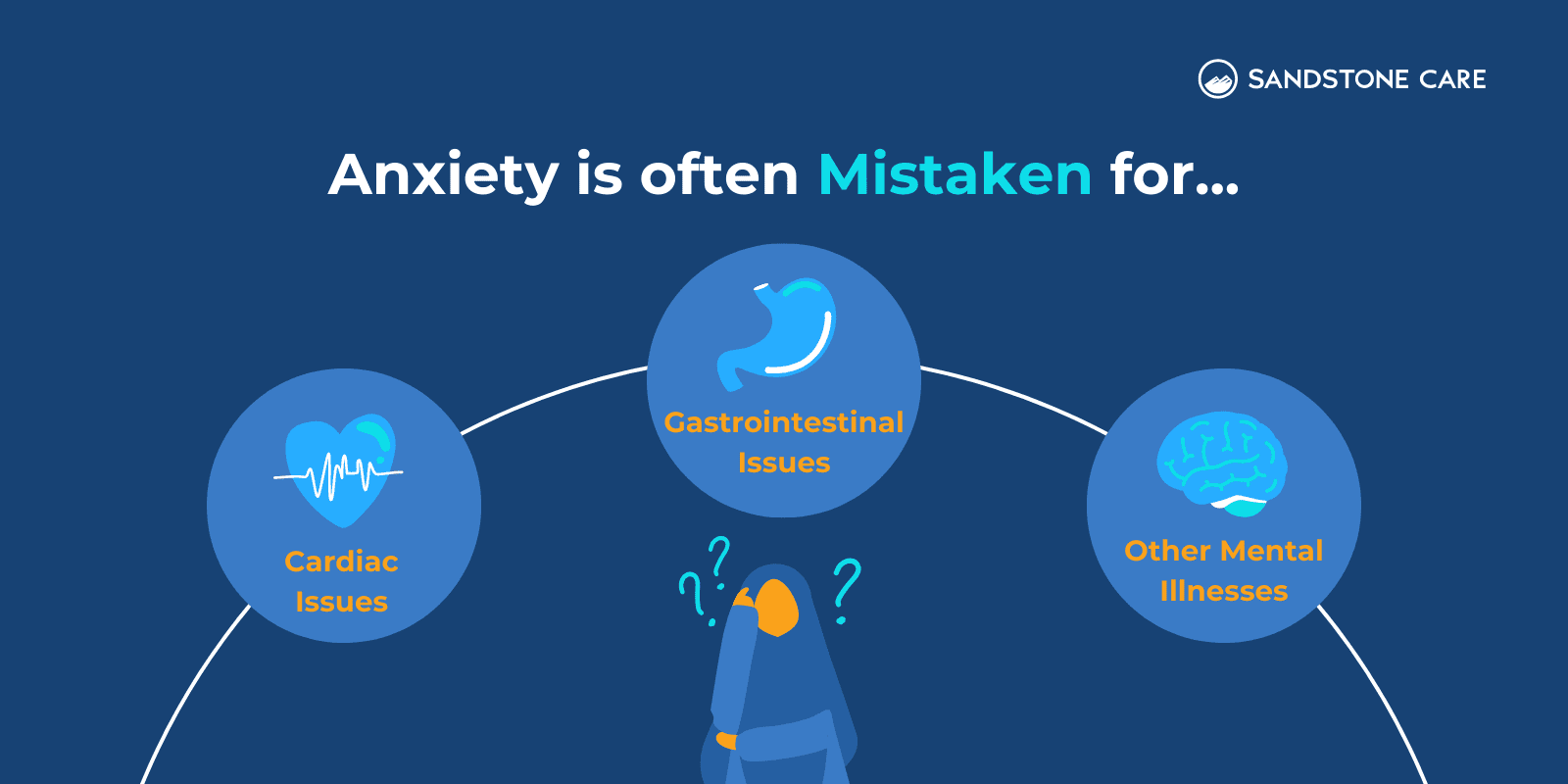
Does A Doctor Have To Diagnose Anxiety?
Yes, a doctor, psychologist, or another mental health professional has to give an anxiety diagnosis.
Anxiety Treatment
What is the Best Treatment For Anxiety Symptoms?
Not every treatment for anxiety works the same for everyone.
The best treatment is the one that works for you and your specific needs.
Anxiety disorders are most commonly treated with psychotherapy, anxiety medications, or a combination of both.
One of the most common forms of talk therapy is cognitive-behavioral therapy (CBT). CBT refers to a wide range of treatment approaches that can help a person identify unhealthy thoughts, feelings, and behaviors and learn new skills and ways to change or cope.
Support groups can also help people with anxiety to feel less alone and share ideas on how to best cope.
Anxiety medications can help address underlying imbalances in the brain, such as a lack of serotonin, that may be worsening anxiety symptoms. Medications, such as antidepressants and benzodiazepines, are commonly prescribed for anxiety after possible side effects are taken into consideration.
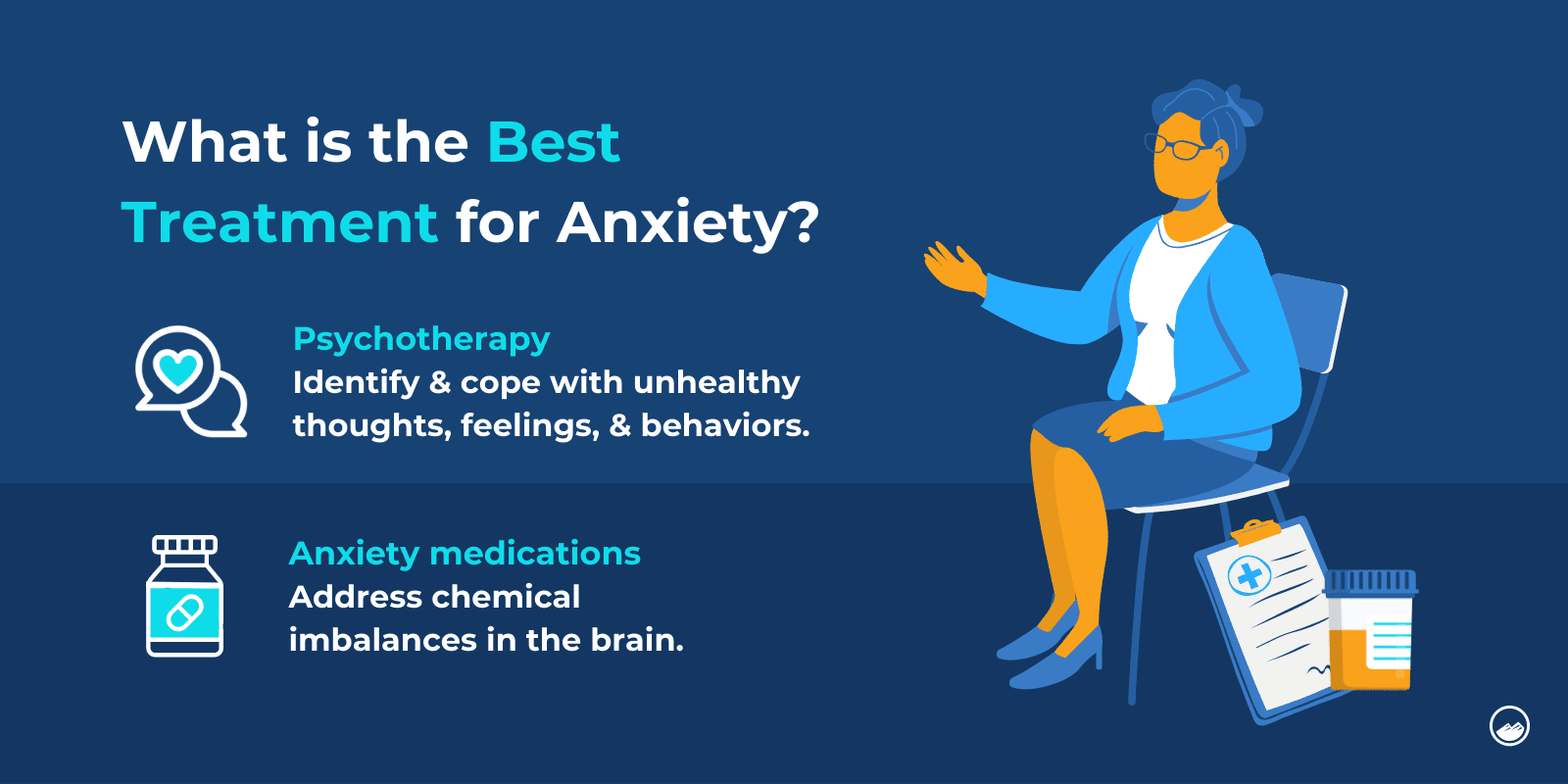
What Are Five Coping Skills?
5 coping skills that you can practice in everyday life to cope with and manage symptoms of anxiety include:
- Practicing breathing exercises
- Going outside or going for a walk
- Practicing mindfulness or meditation
- Getting physical exercise
- Journaling and writing down your feelings
FAQ
You Have Questions, We Have Answers.
Our goal is to provide the most helpful information. Please reach out to us if you have any additional questions. We are here to help in any way we can.
Being yelled at can change the mind, the brain, and the body in many different ways, such as increasing the activity of the amygdala and increasing stress hormones.
Yelling at a person with anxiety can trigger their symptoms and make them feel worse.
When you yell at a person with anxiety, it can make them feel afraid, humiliated, and distressed.
They might shut down and fall into a negative spiral of emotions.
Yelling can also impact a person’s self-esteem, self-worth, confidence, and much more, especially when they are being yelled at by someone very close to them.
Anxiety disorders can cause symptoms of anger, irritability, and frustration.
It can become very overwhelming when a person with anxiety becomes triggered. For example, if a person with a social anxiety disorder is blindsided by a social situation, they can become uncomfortable, irritated, and angry.
Additionally, when a person has undiagnosed or unacknowledged anxiety disorders, it may cause them to get mad more quickly because they may not have addressed underlying problems that affect their mood and emotion regulation.
“Brain fog” is a term that is used when a person feels mentally fatigued and is often described as “being hard to think.”
Sometimes, anxiety can cause brain fog, where a person has difficulty thinking and concentrating. Anxiety-induced brain fog can make daily tasks feel very difficult to start or complete.
Dissociation can be a symptom of anxiety.
When a person dissociates, they feel disconnected from themselves and the world around them.
It can feel that the world is not real, as if they are in a dream-like state.
Some people describe anxiety dissociation as feeling detached, numb, strange, or surreal.


Anxiety Can Make it Hard to Get Through the Day, We are Here to Make it Easier
Sandstone Care is here to support teens and young adults with mental health and substance use disorders.

